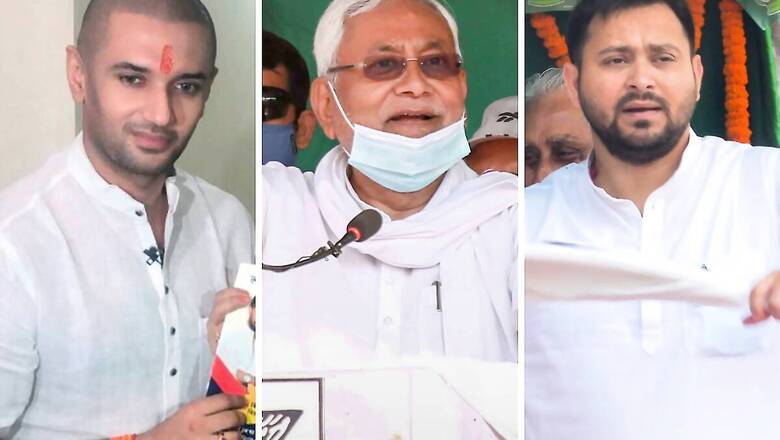Transfer of Votes, New Blood & Minority Seats: What Phase 1 of Bihar Polling Means for Those in Fray

views
The first phase of polling in Bihar is indicative of a fundamental shift in voting pattern by key social grouping, which might get reflected in the final outcome as well if these voting preferences are to hold in the remaining two rounds.
The question which emerges most significantly is the transfer of votes between alliance partners in both NDA and Mahagathbandhan parties, which will determine the strength of the three dominant parties — JD(U), BJP and RJD – in the new assembly.
The first factor being keenly watched by commentators and participants alike is whether BJP’s upper-caste voter, especially the youth, is inclined to vote for Nitish Kumar’s JD(U) candidate. And whether attrition is also being exacerbated by Chirag Paswan’s LJP and the lure of ‘sarkari naukari’ by Tejashwi Yadav.
At the peak of their combined popularity, the NDA bagged 206 out of 243 seats in the 2010 assembly polls by appropriating 40% of the votes. With RJD making determined efforts to wean away NDA voters by increasing its catchment area, 2020 by was a close contest from Day 1.
A tour on a representative sample of the seats while the votes were being cast in the first phase of polling shows how this electoral battle in Bihar is so different from any other witnessed in the last three decades. Old loyalties are crumbling and new socio-political alliances are being formed. A look at the key seats:
Masaudhi: This seat is witnessing a contest between RJD’s sitting MLA Rekha Devi and JDU’s Nutan Paswan whereas the LJP has fielded Parashuram Paswan. The RJD is banking on the support of CPI-ML this time, which has a sizeable clout among the Dalits of the area. The vote transfer among Mahagathbandhan parties would be the key to the outcome of the results here. The NDA partners have a strained relationship and the CPI(ML), which bagged 18,000 i.e. 10% vote in 2015, is part of the RJD alliance.
Bikram: The Congress is contesting here by nominating sitting MLA Siddharth Singh. BJP has fielded Atul Kumar, who is said to enjoy close ties with some Maharashtra politicians. Anil Kumar, a strong BJP ticket aspirant, is contesting as an Independent. Singh is banking on the vote transfer of both RJD and CPI(ML). The mahagathbandhan partners are working overtime to ensure vote transfer in this seat to the Congress candidate.
Paligunj: CPI-ML’s Sandeep Saurabh, who comes from the Yadav community, is pitted against JDU’s Jaivardhan Yadav. Usha Vidyarthee of LJP, who is an upper caste and ex-MLA of the area, is playing the spoilsport for the JD(U) nominee.
Badhara: Veteran Raghvendra Pratap Singh, who was an RJD MLA in 2005 and 2010, is contesting on a BJP ticket. This seat is witnessing a tough fight with Saroj Yadav of RJD, who is sitting MLA, also in the fray. The BJP is hoping to consolidate all non-Mahagathbandhan votes in this constituency.
Arah: Here again, BJP candidate Amarendra Pratap Singh, three-time MLA from 2000 to 2010, is hoping to consolidate all anti-grand alliance votes against RJD supported CPI(ML) candidate. RJD has dropped its Muslim sitting MLA and conceded the seat to CPI-ML who has fielded an Ansari Muslim.
Angiyaon: CPI(ML)’s Manoj Manjil is seeking to dent JD(U) by mobilising EBC and Maha Dalits. The JD(U)’s Prabhu Nath Prasad, sitting MLA, is also facing LJP’s Rajeshwar Paswan.
Sandesh: In this constituency, one witnesses a division of votes in the NDA camp as Vijendra Yadav of JDU is up against Shweta Singh of LJP. This can bolster chances of RJD’s Kiran Devi, who is the wife of Arun Yadav — a local ‘baahubali’. The RJD is also banking on vote transfer by CPI(ML), which bagged 10% votes in 2015 elections.
Jagdishpur: Here again, both JDU and LJP candidates are from EBC Kushwaha community. Again, RJD is banking on CPI(ML) to compensate for any local anti-incumbency against its candidate. CPI(ML) got 12% votes in this constituency in 2015.
Tarari: BJP in this seat is facing rebel candidate Sunil Pandey. The three-time MLA is contesting as an independent. The grand alliance candidate is sitting CPI(ML) MLA Sudama Prasad. The outcome may depend of RJD’s ability to transfer its votes to the Left candidate.
On the ground, the mahagathbandhan parties are relying on vote transfer to bolster prospects of their candidate. In places, NDA allies are being undercut by either rebels or LJP nominees. The RJD is trying to under play the caste underpinnings by aggressively poaching on NDA support base by making unemployment its calling card.
The 35 plus age group, however, carries a distinct memory of the Lalu-Rabri Raj and this segment may continue to bet on Nitish Kumar.
The areas which witnessed polling in the first phase have a low concentration of minority votes. The second and third phase polling is in districts with pockets of sizeable Muslim votes and it remains to be seen if any religious polarisation affects voter preference in the next two rounds.
The votes will be counted 10 days from now. And even in retrospect, it would be interesting to know if BJP would have fared better by going solo as it did in 2015.
Read all the Latest News and Breaking News here


















Comments
0 comment